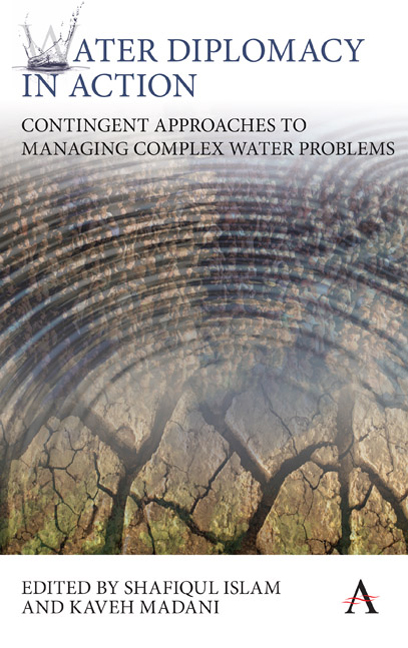Book contents
- Frontmatter
- Contents
- List of Figures
- List of Tables
- The Blind Men, the Elephant and the Well: A Parable for Complexity and Contingency
- Preface
- Part I ROOTS AND CAUSES OF COMPLEXITY AND CONTINGENCY IN WATER PROBLEMS
- Part II TOOLS, TECHNIQUES, MODELS AND ANALYSES TO RESOLVE COMPLEX WATER PROBLEMS
- Part III CASE STUDIES
- Notes on Contributors
- Index
Preface
Published online by Cambridge University Press: 10 January 2018
- Frontmatter
- Contents
- List of Figures
- List of Tables
- The Blind Men, the Elephant and the Well: A Parable for Complexity and Contingency
- Preface
- Part I ROOTS AND CAUSES OF COMPLEXITY AND CONTINGENCY IN WATER PROBLEMS
- Part II TOOLS, TECHNIQUES, MODELS AND ANALYSES TO RESOLVE COMPLEX WATER PROBLEMS
- Part III CASE STUDIES
- Notes on Contributors
- Index
Summary
Today, a billion people lack access to clean water. Water scarcity affects one in three people on our planet. These complex water problems are sobering— but not new. A hundred years ago, in the first issue of the American Economic Review, Katharine Coman published “Some Unsettled Problems of Irrigation.” She used irrigation systems in the United States west of the one hundredth meridian to describe intricate collective- action problems. This was almost half a century before Garett Hardin identified the so- called tragedy of the commons and associated theoretical and implementation problems related to common pool resource management.
The process of converting the desert into farmland demonstrated the challenges of achieving a collective good (in this case, building and running an irrigation system). In her reflections on Coman's article, Elinor Ostrom summarized that “changing the formal governance structure of irrigation is not sufficient to ensure efficient investment in facilities or that farmers are able to acquire property and make a reasonable living. Building knowledge and trust are, however, essential for solving collective- action problems.”
Today, in our highly interconnected and globalized world, water is an integral part of any discussion on energy, agriculture, public health, transportation, environment and the future. In the past, we have tried to solve our water problems with reservoirs, dams and treatment facilities. Now, we know that these responses often did not balance the valueladen needs of individuals and communities with those of industry and agriculture, nor did they sufficiently protect our natural resources. We have discovered that many of our intended solutions are not sustainable, especially considering global population growth, consumption ethic and the changing global climate. We must find ways to resolve water problems, account for legacy effects from past allocation and infrastructure development decisions, and meet demands for industrial and economic growth while ensuring a more sustainable future.
Our challenge is how to translate solutions that emerge from science and technology into the messy context of the real world. In the present volume, we hope to address this challenge by synthesizing two emerging ideas— complexity and water diplomacy— to understand and manage risks and opportunities for an uncertain water future.
- Type
- Chapter
- Information
- Water Diplomacy in ActionContingent Approaches to Managing Complex Water Problems, pp. xvii - xxivPublisher: Anthem PressPrint publication year: 2017



